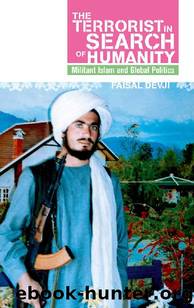Terrorist in Search of Humanity by Faisal Devji

Author:Faisal Devji [Devji, Faisal]
Language: eng
Format: epub
Publisher: Oxford University Press
Published: 2019-12-02T00:00:00+00:00
Empires of the mind
The globalization of Arabness as a moral category has a well-established pre-history in the Muslim world beyond the Middle East, which has for centuries now had to reconcile the Arab element in Islam with its own traditions and languages. Naturally in the period before nationalism this reconciliation had nothing to do with any culture war between Arab and non-Arab, such terms themselves being fluid and changeable, though a nationalist factor does enter the equation in modern times. Prior to the emergence of the oil-rich states of the Gulf, then, and prior even to the emergence of the Middle East, let alone the Israeli-Palestinian conflict, Arabness was defined as a conceptual category in important and influential ways outside the region. It found expression in British India, through the literary and expository work of the poet-philosopher Muhammad Iqbal, who was undoubtedly the most important and indeed the most popular Muslim thinker of twentieth-century South Asia, though his influence went well beyond the subcontinent. For I want to suggest that only by attaching itself to such histories of the imagination does globalized militancy today achieve intellectual and political traction in the larger Muslim world.
Like Azadâs claims for the sanctity of the Arabian Peninsula, Iqbalâs conception of Arabness as an intellectual category fell heir to a long literary history in which the word Arab had exercised the Indian imagination. In earlier times, of course, Arabia was imagined neither in ethno-linguistic nor territorial terms, but was defined rather by the cosmopolitan and, as we would say today, multinational pilgrim cities of Mecca and Medina. And because these cities had lost power very soon after the Prophetâs death, with Arabia as a whole becoming a minor province within the great empires that succeeded him, they possessed little if any political importance of their own. Indeed the holy cities were treated both by Muslim rulers and their rivals as honourable places of exile, a role the peninsula continues to play even today for deposed heads of state. Naturally the sanctuary of Mecca in particular was even more important as a place of exile for dissident clerics, and it is remarkable how many of them fled there from the exactions of colonial rule eventually to return and lead resistance movements, whether violent or pacifist in nature. The Mahatmaâs associate Abul Kalam Azad was himself born in Mecca, and throughout his career made full use of the prestige this Arabian background lent him. Dependent though this prestige was upon Azadâs use of the Arabic language, or rather an Urdu larded with Arabic locutions, there was nothing of the ethno-national in it. In fact the stereotyped character of the Bedouin, as Arabiaâs indigenous peoples were called, possessed mostly negative connotations in the literary culture to which Azad belonged, being associated mostly with savagery and the looting of pilgrim caravans. We owe the romantic image of the desert Arab to European influence.
By the middle of the eighteenth century this distant peninsula that was so difficult to traverse had begun to occupy a different kind of space in the imagination of Indiaâs Muslim elite.
Download
This site does not store any files on its server. We only index and link to content provided by other sites. Please contact the content providers to delete copyright contents if any and email us, we'll remove relevant links or contents immediately.
| Africa | Americas |
| Arctic & Antarctica | Asia |
| Australia & Oceania | Europe |
| Middle East | Russia |
| United States | World |
| Ancient Civilizations | Military |
| Historical Study & Educational Resources |
Never by Ken Follett(2882)
The Man Who Died Twice by Richard Osman(2300)
Machine Learning at Scale with H2O by Gregory Keys | David Whiting(2292)
Fairy Tale by Stephen King(2071)
Will by Will Smith(2043)
Rationality by Steven Pinker(1765)
The Dawn of Everything: A New History of Humanity by David Graeber & David Wengrow(1571)
The Dark Hours by Michael Connelly(1571)
Principles for Dealing With the Changing World Order: Why Nations Succeed and Fail by Ray Dalio(1378)
Friends, Lovers, and the Big Terrible Thing by Matthew Perry(1330)
A Short History of War by Jeremy Black(1300)
HBR's 10 Must Reads 2022 by Harvard Business Review(1256)
Go Tell the Bees That I Am Gone by Diana Gabaldon(1235)
Can't Hurt Me: Master Your Mind and Defy the Odds - Clean Edition by David Goggins(1227)
515945210 by Unknown(1209)
Fear No Evil by James Patterson(1109)
443319537 by Unknown(1073)
Works by Richard Wright(1020)
Going There by Katie Couric(993)
